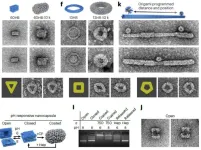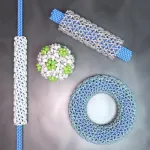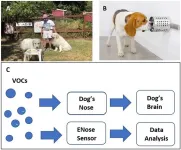(Press-News.org)
NNew research appearing in the journal Nature Biotechnology answers important questions about the viability of treatments that seek to replace diseased and aged cells in the central nervous system with healthy ones. Its findings have implications for a number of neurological and psychiatric disorders—including Huntington’s disease, amyotrophic lateral sclerosis (ALS), and schizophrenia—that have been linked to glia, a population of cells that support brain health and function.
“A broad variety of disorders we associate with neuronal loss now appear to be caused by dysfunctional glial cells,” said University of Rochester Medical Center (URMC) professor of Neurology Steve Goldman, MD, PhD, lead author of the new study. “This makes these diseases attractive targets for stem and progenitor cell-based therapies.”
The new study from the URMC Center for Translational Neuromedicine, which Goldman co-directs, describes the ability of human glial progenitor cells–precursor cells that can give rise to both astrocytes and oligodendrocytes, the two major types of glia—to compete with one another in the adult brain, and the competitive advantage of young and healthy cells over aged and diseased cells.
The culmination of a decade of scientific progress
A number of recent important advances are behind the new findings. In 2013, Goldman and colleagues first reported strategies for producing the brain’s glial support cells from embryonic stem cells. In later research, the lab transplanted these cells into the brains of baby mice, resulting in the creation of human glial-chimeric mice, a technical achievement that enables the researchers to study human glial cells in the living brain. The team showed that after transplantation, the human glial progenitor cells quickly outcompeted native cells, resulting in brains with mouse neurons and human glia.
In later experiments, the lab transplanted human glial cells with the Huntington’s disease (HTT) mutation. They observed that this mutation impaired the function of glial progenitor cells, resulting in poor astrocytes and oligodendrocytes production. The lab also showed that transplanting healthy human glial progenitor cells into mouse models of Huntington’s delayed disease progression, reinforcing the importance role that glial dysfunction plays in this still untreatable neurodegenerative disease.
Young and healthy cells outcompete older and sick ones
As these prior studies were limited to the transplant of human cells into the mouse brain, the question remained whether human cells transplanted into another human brain would yield the same type of benefit. The new Nature Biotechnology study strongly suggests that the answer to this question is yes, and highlights the potential value of cell replacement therapies by showing that healthy human glia will outcompete and replace sick human cells.
To demonstrate this, the researchers first implanted human glial progenitor cells with the HTT mutation into the brains of newborn mice. After the animals reached adulthood, the researchers then transplanted healthy human glial cells, which went on to displace and eliminate their Huntington’s disease counterparts.
“In the striatum, our target area, the healthy cells essentially kicked out the disease cells, eventually replacing the glial progenitor population entirely,” said Goldman. “You can actually see a wave of migration and a border where the cells expressing the HTT mutation are dying off and being replaced by heathy ones.
In an accompanying set of experiments, the researchers found that younger healthy human glial progenitors outcompeted older and otherwise healthy human glia, suggesting that cellular youth is a critical determinant of competitive success.
“These findings have strong therapeutic implications, as they suggest that in the adult human brain, resident glia–whether diseased or simply aged—may be replaced following the introduction of younger and healthier cells,” said Goldman.
Additional authors of the study include John Mariani, Renee Solly, Ashley Tate, Steven Schanz, Natasha Cotrupi, and Abdellatif Benraiss with URMC, and Ricardo Vieira, Gwen Huynh, Hans Stephensen, Marzieh Mousaei, and Jon Sporring with the University of Copenhagen. The research was supported with funding from the Novo Nordisk Foundation, the Lundbeck Foundation, the Olav Thon Foundation, and the Adelson Medical Research Foundation. Goldman holds additional positions at Sana Biotechnology and the University of Copenhagen.
END
Griffith University researchers have played a key role in using DNA ‘origami’ templates to control the way viruses are assembled.
The global team behind the research, published in Nature Nanotechnology, developed a way to direct the assembly of virus capsids – the protein shell of viruses - at physiological conditions in a precise and programmable manner.
Dr Frank Sainsbury and Dr Donna McNeale from the Griffith Institute for Drug Discovery were part of the research team and said forcing viruses to assemble onto DNA folded into different shapes “like origami” was a question that this project answered.
“We achieved control over the virus protein ...
Consumers in the richer, developed nations will have to accept restrictions on their energy use if international climate change targets are to be met, warn researchers.
The big challenge is to identify the fairest and most equitable way that governments can curtail energy use, a process known as energy demand reduction.
Writing in the journal Nature Energy, the research team - led by Milena Büchs, Professor of Sustainable Welfare at the University of Leeds - analysed several scenarios to identify a potential ...
About The Study: This study found that large increases in mortality with Alzheimer disease and related dementias as an underlying or contributing cause of death occurred in COVID-19 pandemic year 1 but were largely mitigated in pandemic year 2. The most pronounced declines were observed for deaths in nursing home/long-term care settings. Conversely, excess deaths at home and in medical facilities remained high in year 2.
Authors: M. Maria Glymour, Sc.D., of the Boston University School of Public Health ...
About The Study: History of present illnesses generated by a chatbot or written by senior internal medicine residents were graded similarly by internal medicine attending physicians. These findings underscore the potential of chatbots to aid clinicians with medical documentation.
Authors: Ashwin Nayak, M.D., M.S., of Stanford University in Stanford, California, is the corresponding author.
To access the embargoed study: Visit our For The Media website at this link https://media.jamanetwork.com/
(doi:10.1001/jamainternmed.2023.2561)
Editor’s Note: Please see the article for additional information, including other authors, author contributions and affiliations, ...
A new study proposes ways to better incorporate adaptation in climate change research, addressing the uneven distribution of adaptation capacities and needs worldwide.
Research on adaptation to the risks posed by climate change has witnessed significant growth in the past decade, with increasing recognition of its urgency in policy agendas at the international, national, and local levels. Adaptation needs and capacities are not evenly distributed worldwide, with countries in the Global South generally experiencing the highest challenges. ...
About The Study: The findings of this study suggest that repetitive heading during a professional soccer career is associated with an increased risk of cognitive impairment in later life. Further study is needed to establish the upper threshold for heading frequency to mitigate this risk.
Authors: Weiya Zhang, Ph.D., of the University of Nottingham in Nottingham, United Kingdom, is the corresponding author.
To access the embargoed study: Visit our For The Media website at this link https://media.jamanetwork.com/
(doi:10.1001/jamanetworkopen.2023.23822)
Editor’s Note: Please ...
Deaths among older adults with dementia fell starkly in nursing homes and long-term care centers after COVID-19 vaccinations became available, yet remained high for those living at home, according to a new study led by UC San Francisco.
The nationwide study published July 17, 2023 in JAMA Neurology, is the first to use data from 2019 to 2022 to quantify “excess” deaths – or those above what would have been anticipated had there been no pandemic – taking into account age, sex, racial and ethnic groups, as well as the settings where people died.
In the first year, there were 509,179 dementia-related ...
Bioengineers have found a way to program the size and shape of virus particles by combining viral protein building blocks and templates made from DNA. The resulting nanostructures could have applications in vaccine development and transporting drugs inside the body.
Virus capsid proteins—the proteins that shield the genome of a virus—can be used to build precisely structured protein assemblies. Their shapes and geometry, however, depend largely on the virus strain. Reprogramming these assemblies, no matter the original ...
Penicillin allergy affects more than 25 million people in the United States (up to 1 in 10 Americans) and has been shown to lead to particularly poor health outcomes in pregnant women and surgical patients. It is also a public health threat, leading to antibiotic resistance and infections in hospitalized patients that can be life threatening.
Seventy-five% or more penicillin allergy labels come on by age 3 due to, for example, confusion with a viral rash. The majority of these rashes were never allergic, but the labels ‘stick’ into adulthood and carry many adverse consequences.”
Many low-risk patients with a penicillin allergy were able to have their ...
Scent dogs may represent a cheaper, faster and more effective way to detect COVID-19, and could be a key tool in future pandemics, a new review of recent research suggests. The review, published in De Gruyter’s Journal of Osteopathic Medicine, found that scent dogs are as effective, or even more effective, than conventional COVID-19 tests such as RT-PCR.
Dogs possess up to 300 million olfactory cells, compared to just 5 or 6 million in humans, and use one-third of their brains to process scent information, ...



